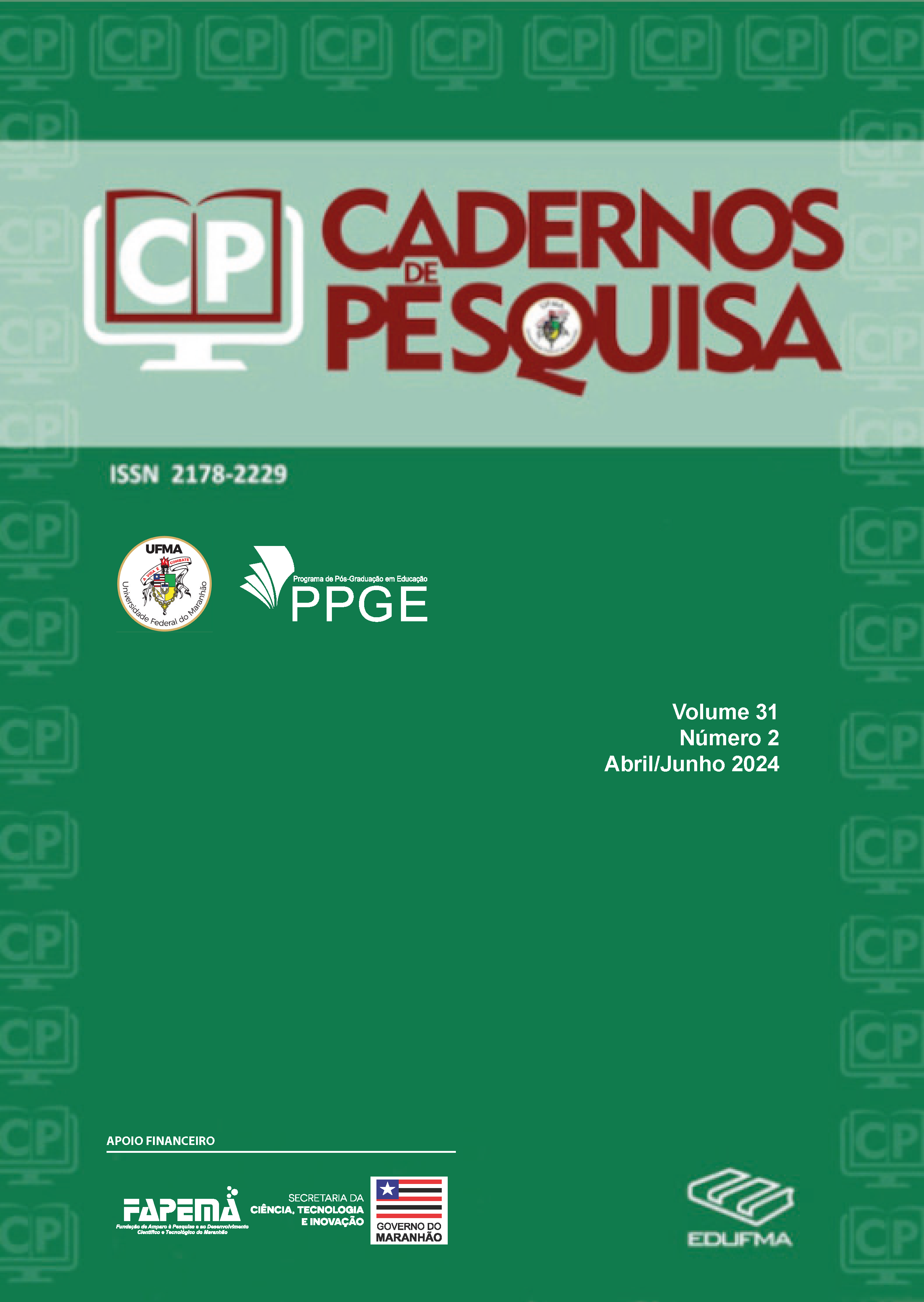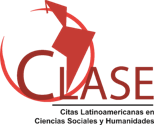Autoethnography: self, identity and reflection as categories of analysis in Ethnography
DOI:
https://doi.org/10.18764/2178-2229v31n2.2024.24Keywords:
autoethnography, self, identity, reflection, ethnographyAbstract
The autoethnography associated with ethnographic research emerges in the literature with the research of Ellis and Bochner starting from 1999 and in it, it gains space as an alternative to ethnographies that
address: stories and life, self-report and the ways in which the researcher tries to insert himself as a subject of speech in the ethnographic narrative. The guiding questions are: What is autoethnography? How has the term been conceptualized and what are the categories associated with it? Who are the most cited authors in these studies and how do they explain autoethnography? The objectives of this article are to explore the concept of
autoethnography, to identify methodological-epistemological lines that guided the analyzed research, and to outline a conceptual profile of the categories associated with the term. The methodology used was the systematic literature review (RBS-Roadmap) and the Atlas.ti23 software for the analysis and derivation of results
from 2,200 articles in English. Of these, 286 articles were selected that used the term autoethnography in the title. As preliminary results, we point out that although the articles emphasize self-writing, in the first person, calling attention to categories such as self, identity and reflection, the excessive use of autobiographical or biographical narrative can make the ethnographic enterprise ethno, of autoethnography, less or less important.
Downloads
References
ADAMS, Tony E.; MANNING, Jimmie. Popular Culture Studies and Autoethnography: An Essay on Method. The Popular Culture Studies Journal. Vol. 3, nº. 1-2. 2015 p. 187-222. Disponível em: http://mpcaaca.org/wp-content/uploads/2015/09/PCSJ-Volume-3-Issues-12.pdf. Acesso em: 28 de maio de 2024.
ADAMS, Tony. E.; JONES, Stacy Linn Holman; ELLIS, Carolyn. Autoethnography: Understanding Qualitative Research. New York: Oxford University Press. 2014. 216p. ISBN: 9780199972098.
ALLEN-COLLINSON, Jacquelyn; HOCKEY, John. Autoethnography: Self-indulgence or Rigorous Methodology. In M. McNamee (ed.) Philosophy and the Sciences of Exercise, Health and Sport. London: Routledge, p. 187-202. 2005. 259p.
ALLEN-COLLINSON, Jacquelyn. Autoethnography as the engagement of self/other, self/culture, self/politics, selves/futures, In Stacy Holman Jones; Tony E. Adams.; Carolyn Ellis, (Eds). Handbook of Autoethnography. New York: Routledge. Cap. 13, p 281-300.2013. 2013.736 p.
ANDERSON, Leon. Analytic Autoethnography. Journal of Contemporary Ethnography. Vol. 35, nº 4. 2006. https://doi.org/10.1177/0891241605280449.
Bochner, Arthur P A. Criteria against ourselves. Qualitative Inquiry. Vol. 6, p. 266–272. 2000.
BOCHNER, Arthur P.; ELLIS, Carolyn. Communication as autoethnography. In Gregory J. Shepherd; Jeffrey St. John; Ted Striphas (Eds.), Communication as Perspectives on theory. p.110–122. Thousand Oaks, CA: Sage. 2006.
BOCHNER, Arthur P.; ELLIS, Carolyn. Evocative Autoethnography: Writing Lives and Telling Stories. New York: Routledge. 2016. https://doi.org/10.4324/9781315545417.
BOYLE, Maree Veronica; PARRY, Ken. Telling the whole story: The case for organizational autoethnography. Culture and Organization, Setembro 2007, vol. 13. nº 3, pp. 185–190. https://doi.org/10.1080/14759550701486480 .
CAULLEY, Darrel N. Making Qualitative Research Reports Less Boring: The Techniques of Writing Creative Nonfiction. Qualitative Inquiry. Vol.14, nº.3, p.424-449. 2008. https://doi.org/10.1177/1077800407311961.
CAYARI, Christopher. Musical theater as performative autoethnography: a critique of LGBTQIA+ representation in school curricula. International Journal of Education & the Arts. Vol. 20, nº.10. 2019. http://doi.org/10.26209/ijea20n10.
CHANG, Heewon. Autoethnography as method. Walnut Creek, CA: Left Coast Press. 2008.
CHANG, Heewon. Individual and Collaborative Autoethnography as Method a Social Scientist’s Perspective. In Stacy Holman Jones; Tony E. Adams.; Carolyn Ellis, (Eds). Handbook of Autoethnography. New York: Routledge. Cap. 3, p 107-123. 2013.
CONFORTO, Edivandro Carlos; AMARAL, Daniel Capaldo; SILVA, Sérgio Luis da. Roteiro para revisão bibliográfica sistemática: aplicação no desenvolvimento de produtos e gerenciamento de projetos. 2011, Anais. Porto Alegre, RS: Escola de Engenharia de São Carlos, Universidade de São Paulo, 2011. Disponível em: https://repositorio.usp.br/item/002833837 . Acesso em: 26 maio de 2024
CORBIN, Juliet M.; STRAUSS, A.L. Grounded Theory Research: Procedures, canons, and evaluative criteria, Qualitative Sociology Vol. 13, nº1, p 3–21. 1990. https://doi.org/10.1007/BF00988593 .
CRENSHAW, Kimberle. Mapping the Margins: Intersectionality, Identity Politics, and Violence against Women of Color. Stanford Law Review, vol. 43, no. 6, 1991, pp. 1241–99. https://doi.org/10.2307/1229039.
CUNNINGHAM, Sally Jo; MATT, Jones. Autoethnography A tool for practice and education, Conference Proceedings. 6th ACM SIGCHI New Zealand Chapter's International Conference on Computer-Human Interaction: Making CHI Natural, 2006, Auckland, New Zealand, julho 7-8, 2005. 10.1145/1073943.1073944.
DELAMONT, Sara. Arguments against Auto-Ethnography. Conference at British Educational Research Association. Annual Institute of Education, University of London, 5-8. September 2007.
DELAMONT, Sara. The only honest thing: autoethnography, reflexivity and small crises in fieldwork. Ethnography and Education. Vol. 4, nº 1. 2009, p. 51-63. https://doi.org/10.1080/17457820802703507.
DENZIN, Norman K. Interpretive autoethnography. 2ªed. Thousand Oaks, CA: Sage. 2014.
DENZIN, Norman K. Performance autoethnography: critical pedagogy and the politics of culture. 2nd. Ed. New York: Routledge. 2018.
DUNCAN, Jack W. A case for great books in management education. Academy of Management Learning & Education. Vol. 3, nº.4, p. 421-428. 2004. Disponível em: http://www.jstor.org/stable/40214312. Acesso em 28 de maio de 2024.
ELLIS, Carolyn; ADAMS, Tony E. Qualitative Scholar Conversation with Carolyn Ellis and Tony Adams. Odum Istitute for Resarch in Social Science. YouTube, video: Qualitative Research Summer Intensive course: The Power and Practice of Autoethnography: Storytelling that Deepens Knowledge and Soothes the Soul. 2024 Disponível em: https://youtu.be/HqWHwhPydDM?si=KKMA6kITyNx608XW . Acesso em 28 de maio de 2024.
ELLIS, Carolyn; ADAMS, Tony E.; BOCHNER, Arthur P. Autoethnography: An Overview. Forum Qualitative Sozialforschung / Forum: Qualitative Social Research, vol. 12, nº. 1, 2011. Disponível em: http://nbn-resolving.de/urn:nbn:de:0114-fqs1101108. Acesso em: 26 maio. 2024.
ELLIS, Carolyn; BOCHNER, Arthur (Eds). Composing ethnography : alternative forms of qualitative writing. Walnut Creek, CA: AltaMira Press. 1996. 400p.
ELLIS, Carolyn; BOCHNER, Arthur. Analyzing analytic autoethnography: An autopsy. Journal of Contemporary Ethnography. Vol. 35, nº 4. 2006. p 429-449. https://doi.org/10.1177/089124160628697.
ELLIS, Carolyn; BOCHNER, Arthur. Autoethnography, Personal Narrative, Reflexivity: Researcher as Subject, In Norman Denzin and Yvonna Lincoln. The Handbook of Qualitative Research. Thousand Oaks, CA: Sage. 2000, p733-768
ELLIS, Carolyn. The Ethnographic I: A Methodological Novel about Autoethnography. Vol.13.Ethnographic alternatives book series. Walnut Creek, CA: AltaMira Press. 2004.
FA'AVAE, David. Giving voice to the unheard in higher education: Critical autoethnography, Tongan males, and educational research. Mai Journal. Vol. 7, nº 2. 2018. https://doi.org/10.20507/MAIJournal.2018.7.2.2
FOUCAULT, Michel. A escrita de si. In: Motta, B. M. (Org.) Rio de Janeiro: Forense Universitária. (Coleção Ditos e Escritos) 2006. p. 145-162. Disponível em: http://www.historiacultural.mpbnet.com.br/pos-modernismo/Foucault-A_escrita_de_si.pdf. Acesso em: 26 maio. 2024
HAMILTON, Miriam. An Autoethnographic self-study navigating the transition to becoming a STEM teacher educator. The Qualitative Report, vol. 26, nº.1, p. 296-315. 2021. https://doi.org/10.46743/2160-3715/2021.4462 .
HAO, Richie Neil. Performing Fortune Cookie: An Autoethnographic Performance on Diasporic Hybridity. In: Robin M Boylorn e Mark P. Orbe, (Eds) Critical Autoethnography: Intersecting cultural identities in everyday life. Cap. 5, p.96-110. Walnut Creek, CA: Left Coast Press. 2014.
HARWOOD, Stephen: EAVES, Sally. In search of an autoethnographic method. 16th European Conference on Research Methodology for Business and Management Studies, ACPI. Dublin Institute of Technology (DIT) Dublin, Ireland, 22-23 June 2017.p.145-153. 2017.
HEIDER, Karl G. What Do People Do? Dani Auto-Ethnography. Journal of Anthropological Research, vol. 31, no. 1, 1975, pp. 3–17. Disponível em: http://www.jstor.org/stable/3629504. Acesso em 28 de maio de 2024.
HENANDEZ, Kathy-Ann C. Embracing the Perspective of the Other. In K. A. Longman, M. Loyd- Paige, R. Hernandez, K. C. Hernandez, A. Ash, Diversity Matters: Race. Ethnicity and the Future of Christian Higher Education, Abilene Christian University Press. 2017.
JOHNSON, Royel M. Black and Male on Campus: An Autoethnographic Account. Journal of African American Males in Education. Vol. 4, nº 2. 2013.
JONES, Stacy Holman; ADAMS, Tony E.; ELLIS, Carolyn (Eds). Handbook of Autoethnography. New York: Routledge. 2013.
JONES, Stacy Holman; PRUYN, Marc. Creative Selves/Creative Cultures: Critical Autoethnography Performance and Pedagogy. Cham, Switzerland: Springer Nature. 2018. https://doi.org/10.1007/978-3-319-47527-1.
JONES, Stacy Holman. Living Bodies of Thought: The Critical in Critical Autoethnography. Qualitative Inquiry. Vol. 22 , nº 4, p.1-10, 2016. https://doi.org/10.1177/1077800415622509.
KAFAR, Marcin: ELLIS, Carolyn. Autoethnography, Storytelling, and Life as Lived: A Conversation Between Marcin Kafar and Carolyn Ellis. Przegląd Socjologii Jakościowej. Vol. X, nº. 3. Autoetnografia – technika, metoda, nowy paradygmat? Polonia. Disponível em: http://www.qualitativesociologyreview.org/PL/Volume27/PSJ_10_3.pdf. Acesso em 27 de maio de 2024.
KELES, Ufuk. Writing a Good Autoethnography in Educational Research: A Writing a Good Autoethnography in Educational Research: A Modest Proposal. The Qualitative Report. Vo. 22, nº 7, p. 20226-2046. 2022. https://doi.org/10.46743/2160-3715/2022.5662.
KEMPNY, Marta. Towards Critical Analytical Auto-Ethnography: Global Pandemic and Migrant Women (Im)mobilities in Northern Ireland. Anthropological Journal of European Cultures. New York: Berghahn Books.Vol. 31, no 1, p 58-71, março 2022. https://doi.org/10.3167/ajec.2022.310105
LEAL-COVEY, Cecilia. An autoethnography on the reasons for mixing identities. Thesis Doctor of Education. University of Phoenix. 2015. 272p. Disponível em: https://www.libreriauniversitaria.it/an-autoethnography-on-reasons-for/book/9781514727447 Acesso em: 26 maio de 2024.
LUMSDEN, Karen. Reflections and Confessions on the Making of a Performative Autoethnography: University Professional Development Reviews and the Academic Self In J. Goode, K. Lumsden; J. Bradford (Eds) Crafting Autoethnography. London: Routledge. Cap.9. p.49-64. 2023. https://doi.org/10.4324/9781003309239.
Autor. Fracasso escolar: uma etnografia. Prefácio por Frederick Erickson. Curitiba: Appris Editora. 287p.
MIELE, Rachelle. Tales from a Hospital Entrance Screener: An Autoethnography and Exploration of COVID-19, Risk, and Responsibility, Journal of Contemporary Ethnography. Vol.52, nº 4, p.493-513. 2023. https://doi.org/10.1177/08912416221131512.
MORELLA-POZZI, Dana. The (Dis)ability Double life: exploring legitimacy, illegitimacy, and the terrible Dichotomy of (Dis)ability in higher education. In: Robin M Boylorn e Mark P. Orbe, (Eds) Critical Autoethnography: Intersecting cultural identities in everyday life. Cap. 10, p.176-195. Walnut Creek, CA: Left Coast Press. 2014.
MORIN, Edgar. O Método 3: O conhecimento do conhecimento. Porto Alegre: Sulina, 1999.
OLMOS-LÓPEZ, Pamela; TUSTING, Karin. Autoethnography and the study of academic literacies: exploring space, team research and mentoring. Dossiê: Trabalhos em Linguística Aplicadas. Vol.59, p.264-295. 2020. https://doi.org/10.1590/010318136565715912020.
PELIAS, Ronald J. The Academic Tourist: An Autoethnography. Qualitative Inquiry. Vol. 9, nº 3. 2003. https://doi.org/10.1177/10778004030090030.
POERWANDARI, Elizabeth Kristi. Minimizing Bias and Maximizing the Potential Strengths of Autoethnography as a Narrative Research. Japanese Psychological Research, Volume 63, No. 4, 310–323, 2021 https://doi.org/10.1111/jpr.12320
PLONDER, Andrea, STADLBAUER, Johanna. Strong Reflexivity and Its Critics: Responses to Autoethnography in the German-Speaking Cultural and Social Sciences. Qualitative Inquiry, Vol. 22(9) 753–765, 2016.
REED-DANAHAY, Deborah E. Auto/ethnography: Rewriting the self and the social. Oxford: Routhedge. 1997.
RICHARDS, Rose. Writing the othered self-autoethnography and problem of objectification in writing about Illness and Disability. Qualitative Health Research. Vol. 18, nº 12, dezembro de 2008, p. 1717-1728. 2008. https://doi.org/10.1177/1049732308325866.
Richardson, Laurel. Writing: A method of inquiry. In Norman K. Denzin & Yconna S. Lincoln (Eds.) Handbook of qualitative research (pp. 516-529). Thousand Oaks, CA: Sage. 1994. 784p.
ROBERTS, Tabatha L. Negating the Inevitable: An Autoethnographic Analysis of First-Generation College Student Status. In: Robin M Boylorn; Mark P. Orbe, (Eds) Critical Autoethnography: Intersecting cultural identities in everyday life. Cap. 2, p.47-61. Walnut Creek, CA: Left Coast Press. 2014.
SMITH, John. LFood, health and psychology: Competing recipes for research and understanding. Journal of Health Psychology, Vol. 9, nº 4, p . 483-496. 2004.
SPARKES, Andrew C. Autoethnography as an ethically contested terrain: some thinking points for consideration. Qualitative Research in Psychology, VOL. 21, NO. 1, 107–139, 2024 https://doi.org/10.1080/14780887.2023.2293073
SPRY, Tami. Performative autoethnography: critical embodiments and possibilities. In The Sage Handbook for Qualitative Research. Norman K. Denzin; Yvonna S. Lincoln (Eds). 4º ed. London: SAGE Publications. 2011.[2005].
STRUTHERS, John. Analytic autoethnography: a tool to inform the lecturer’s use of self when teaching. Thesis. Doctor of Philosophy. Lancaster University, UK, ProQuest Dissertation & Theses, 2012. No.28277289. Disponível em: https://eprints.lancs.ac.uk/id/eprint/62512/1/Struthers_John_Final_2013_Feb.pdf . Acesso em: 26 maio de 2024.
WALL, Sarah. Easier Said than Done: Writing an Autoethnography. International Journal of Qualitative Methods. Vol. 7, nº 1. p. 38-52. 2008. Disponível em: Acesso em 27 de maio de 2024.
YOMTOOB, Desiree. Caught in Code: Arab American Identity, Image, and Lived Reality (pp.144-158). In: Robin M Boylorn; Mark P. Orbe, (Eds) Critical Autoethnography: Intersecting cultural identities in everyday life. Cap. 8, p.144-159. Walnut Creek, CA: Left Coast Press. 2014. 252p.
Downloads
Published
How to Cite
Issue
Section
License

This work is licensed under a Creative Commons Attribution 4.0 International License.
A Cadernos de Pesquisa está licenciada com uma Licença Creative Commons Atribuição 4.0 Internacional.




















